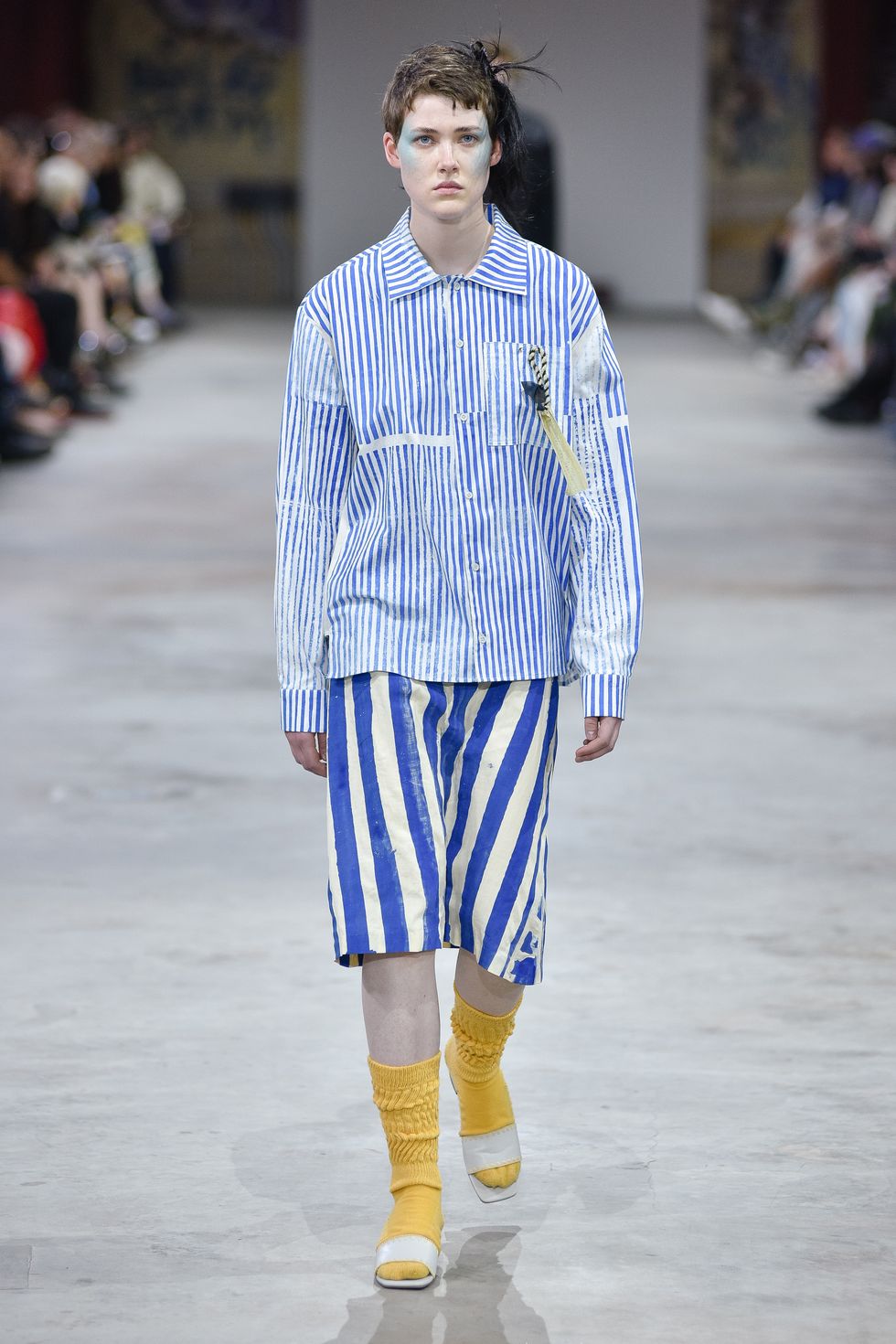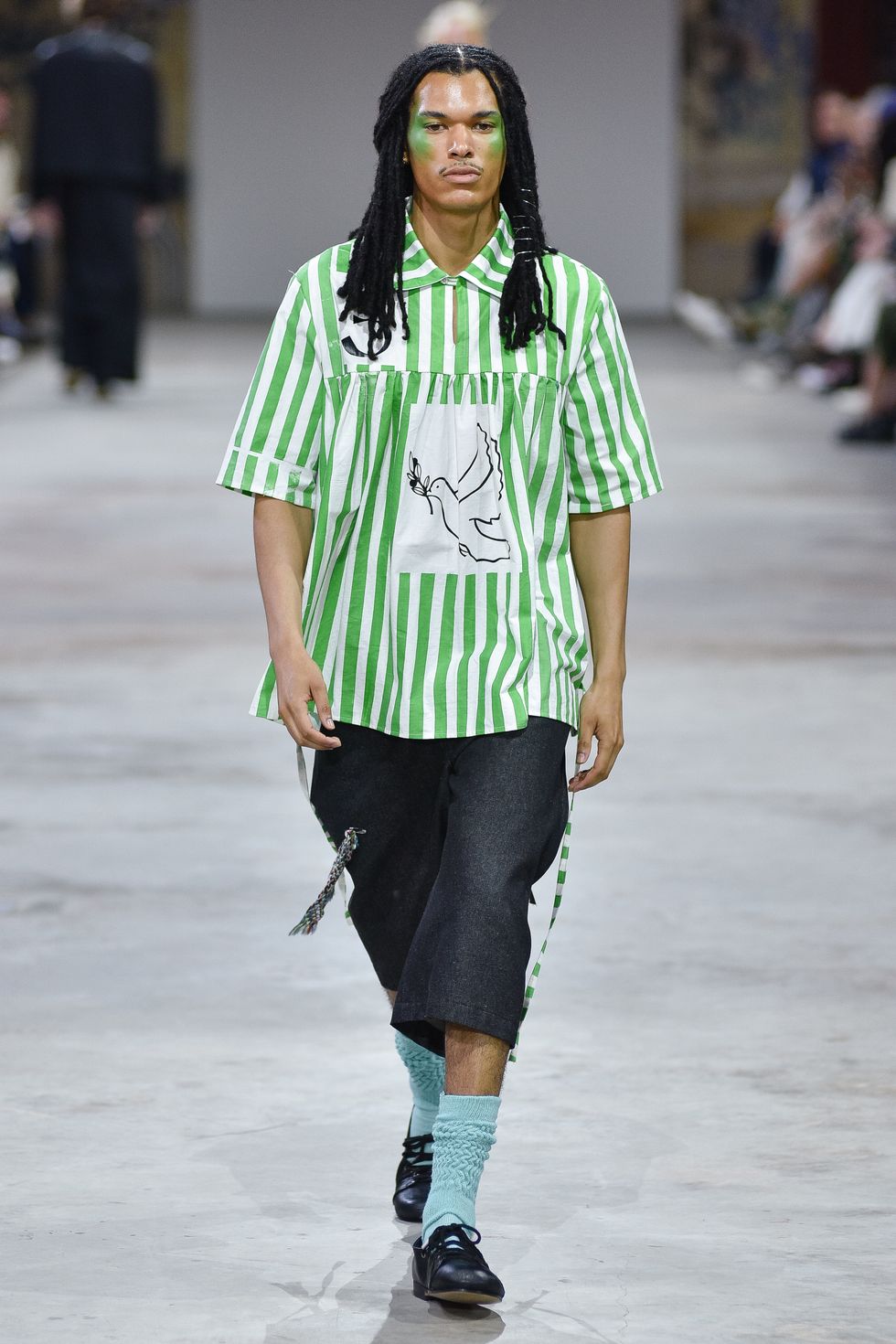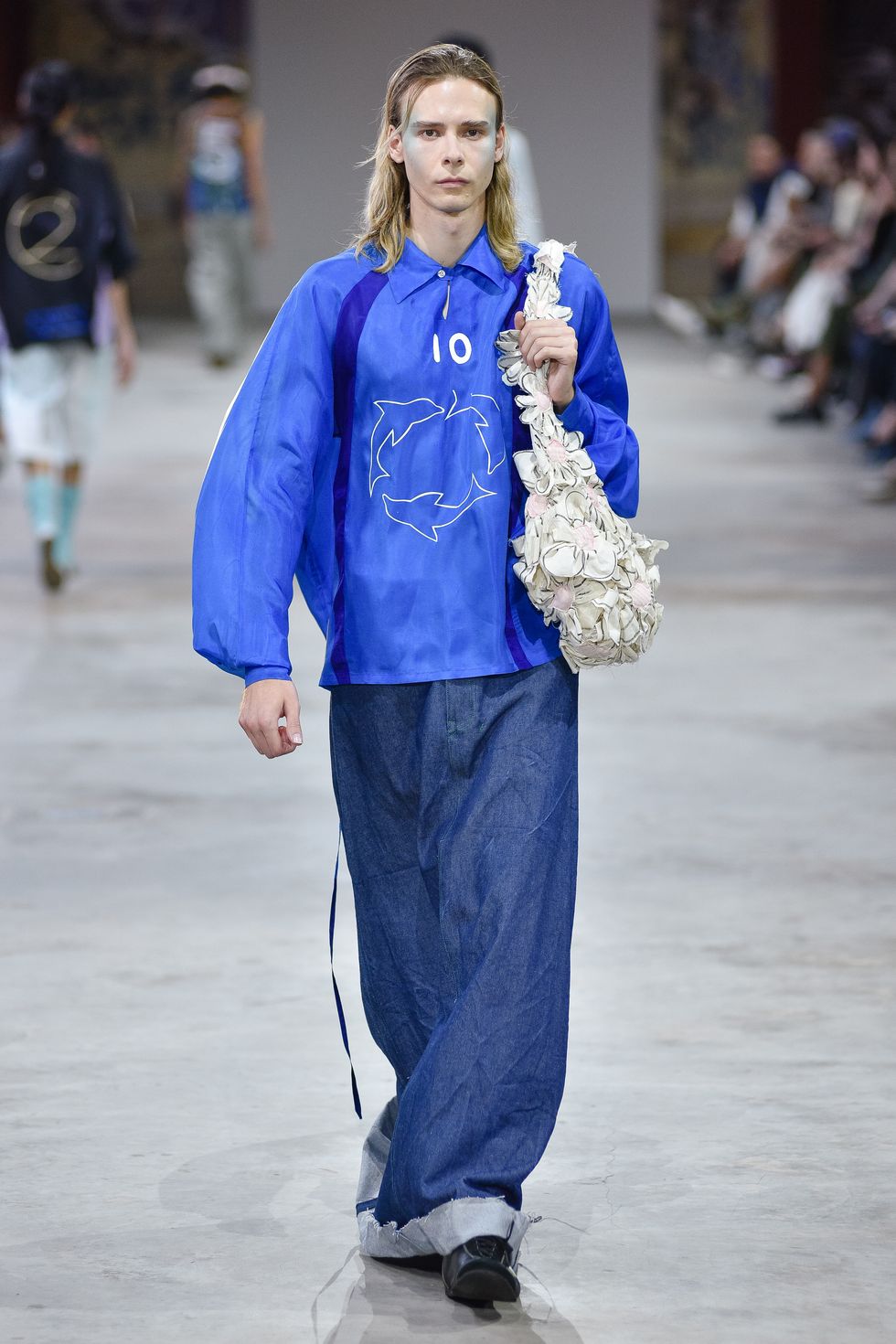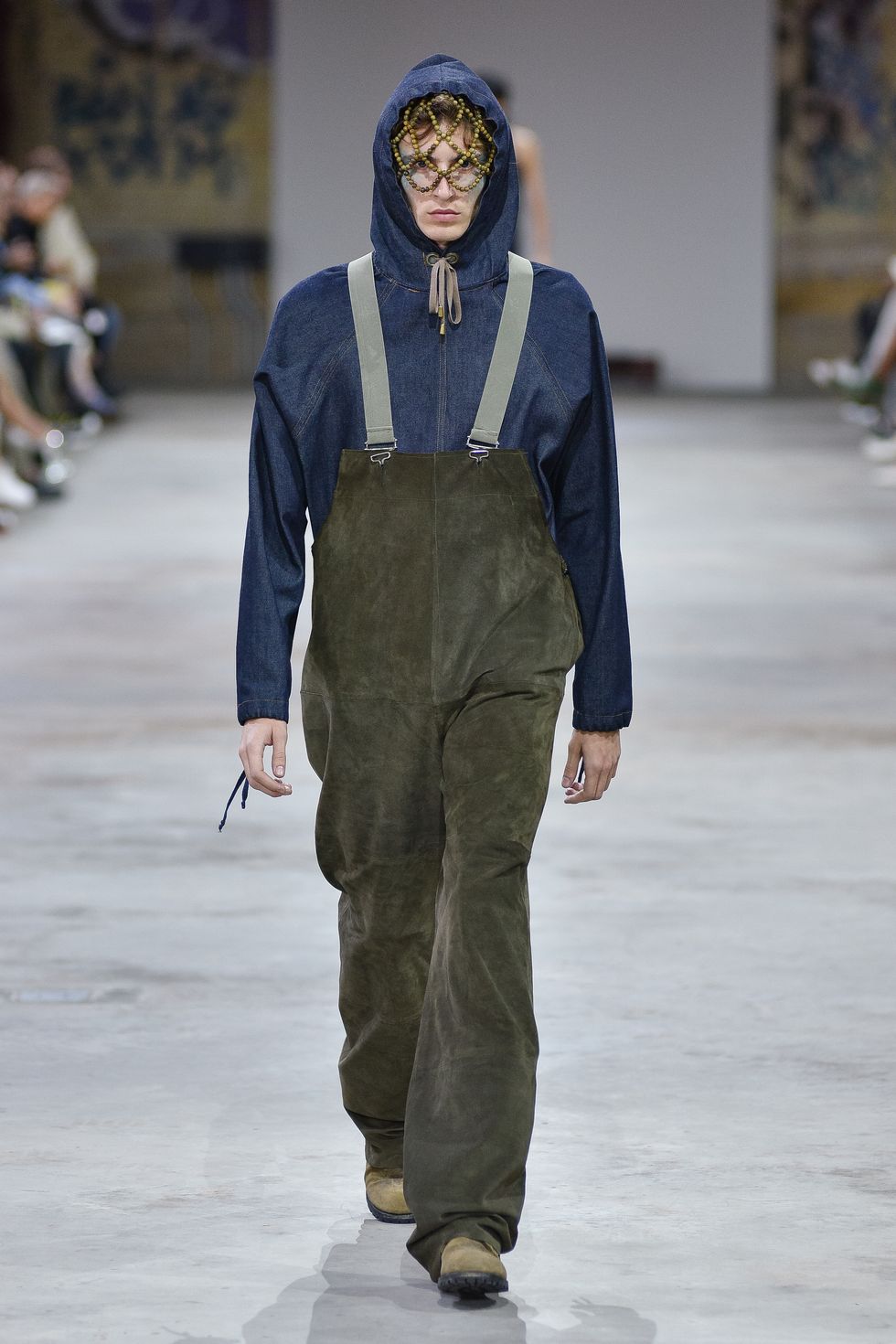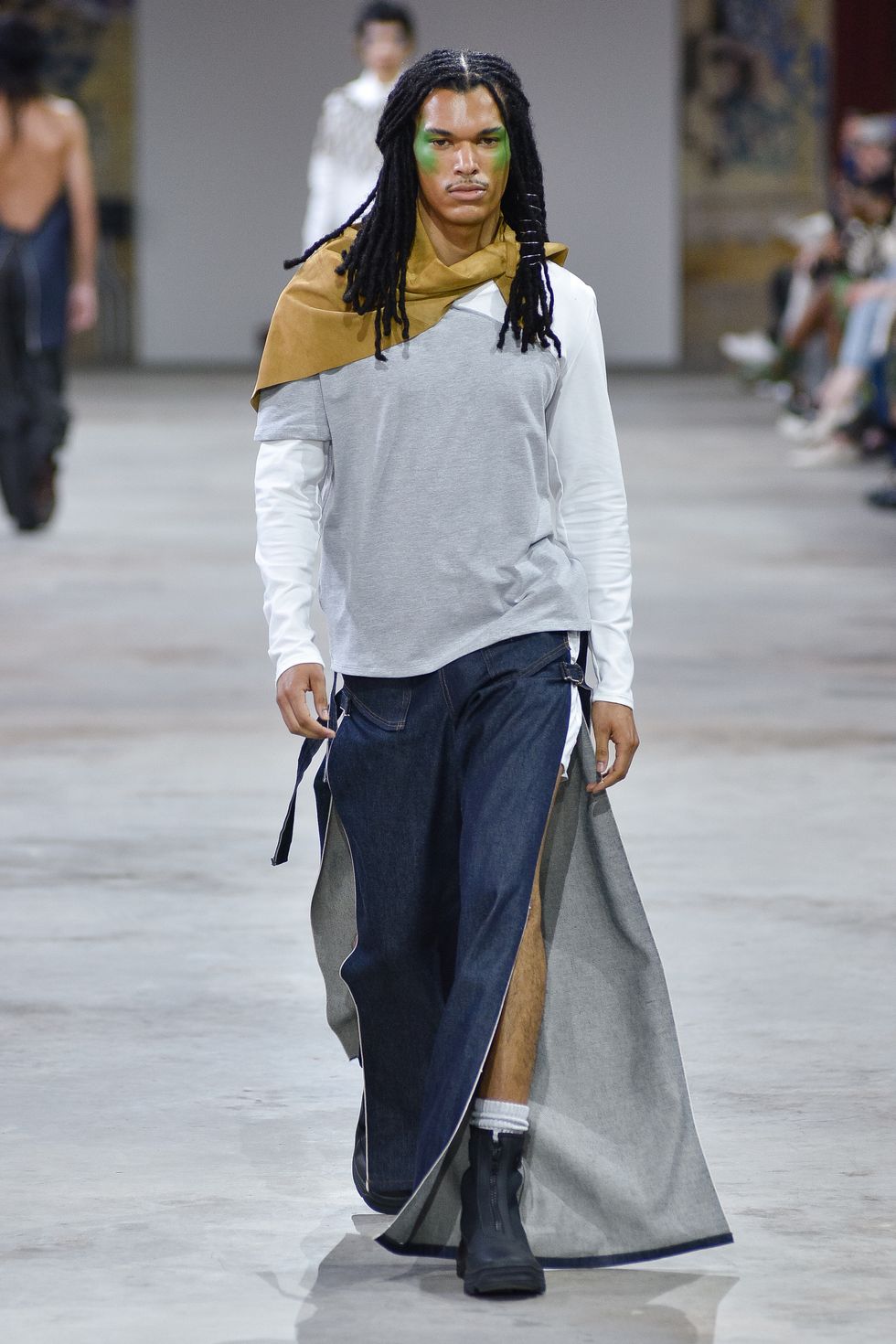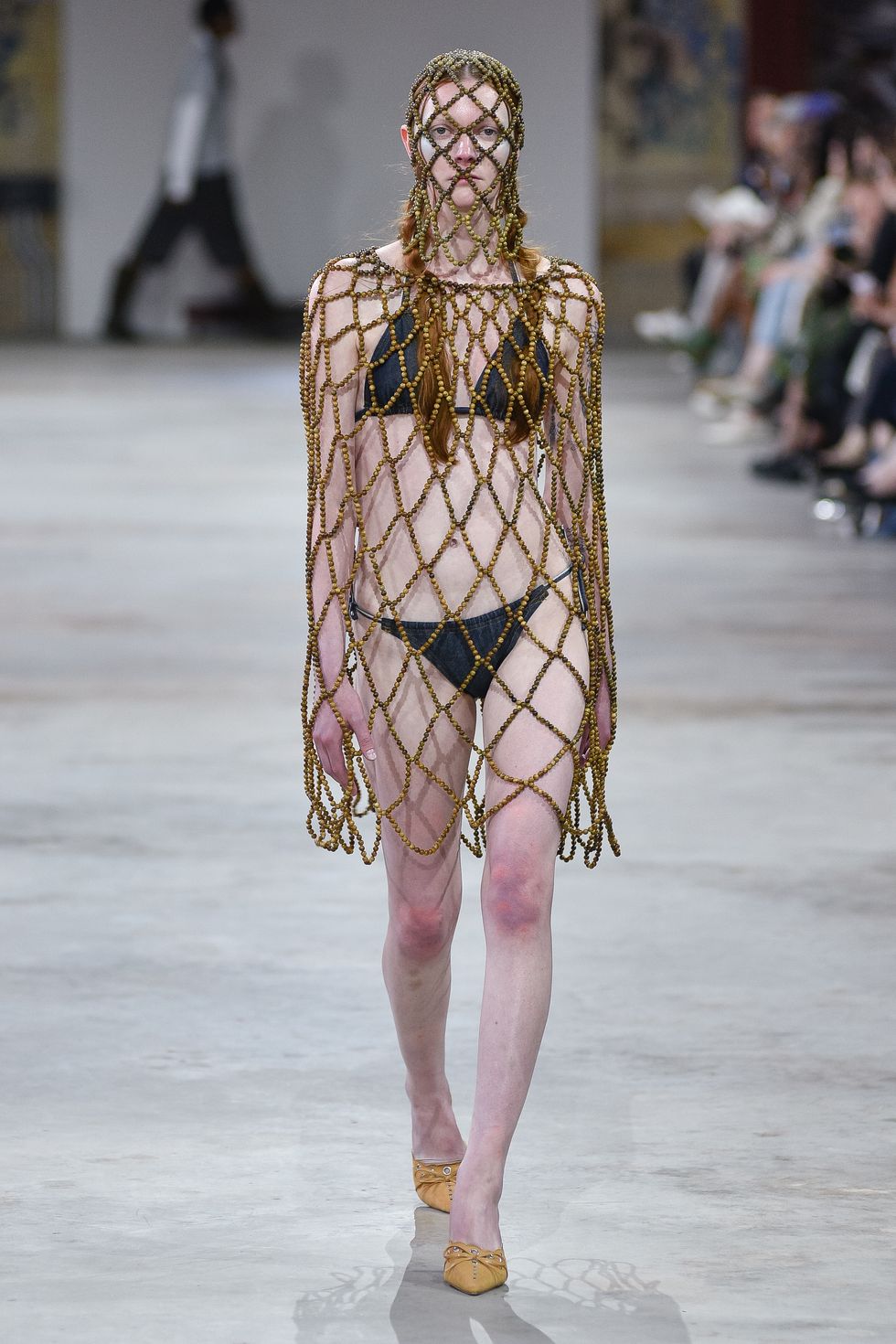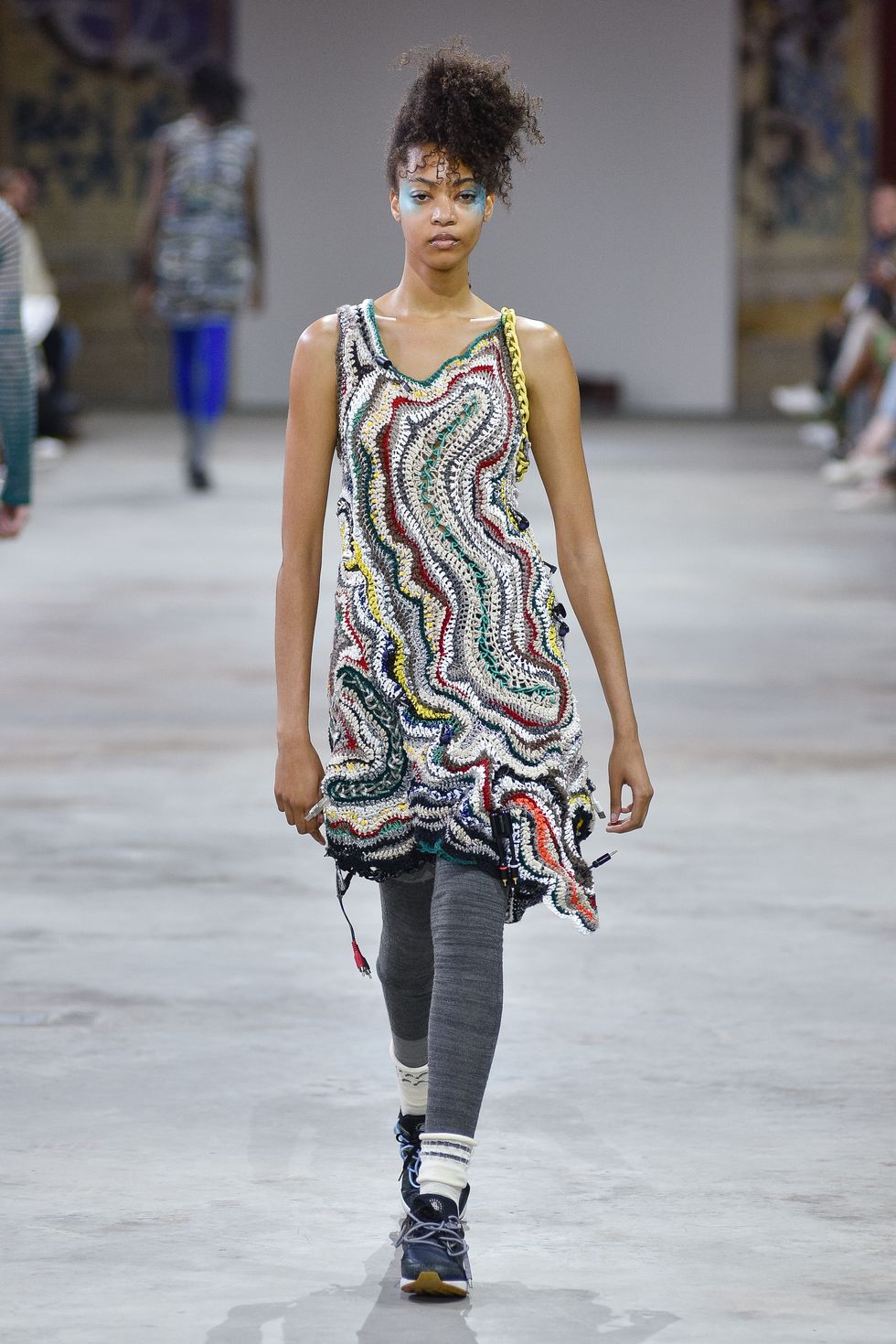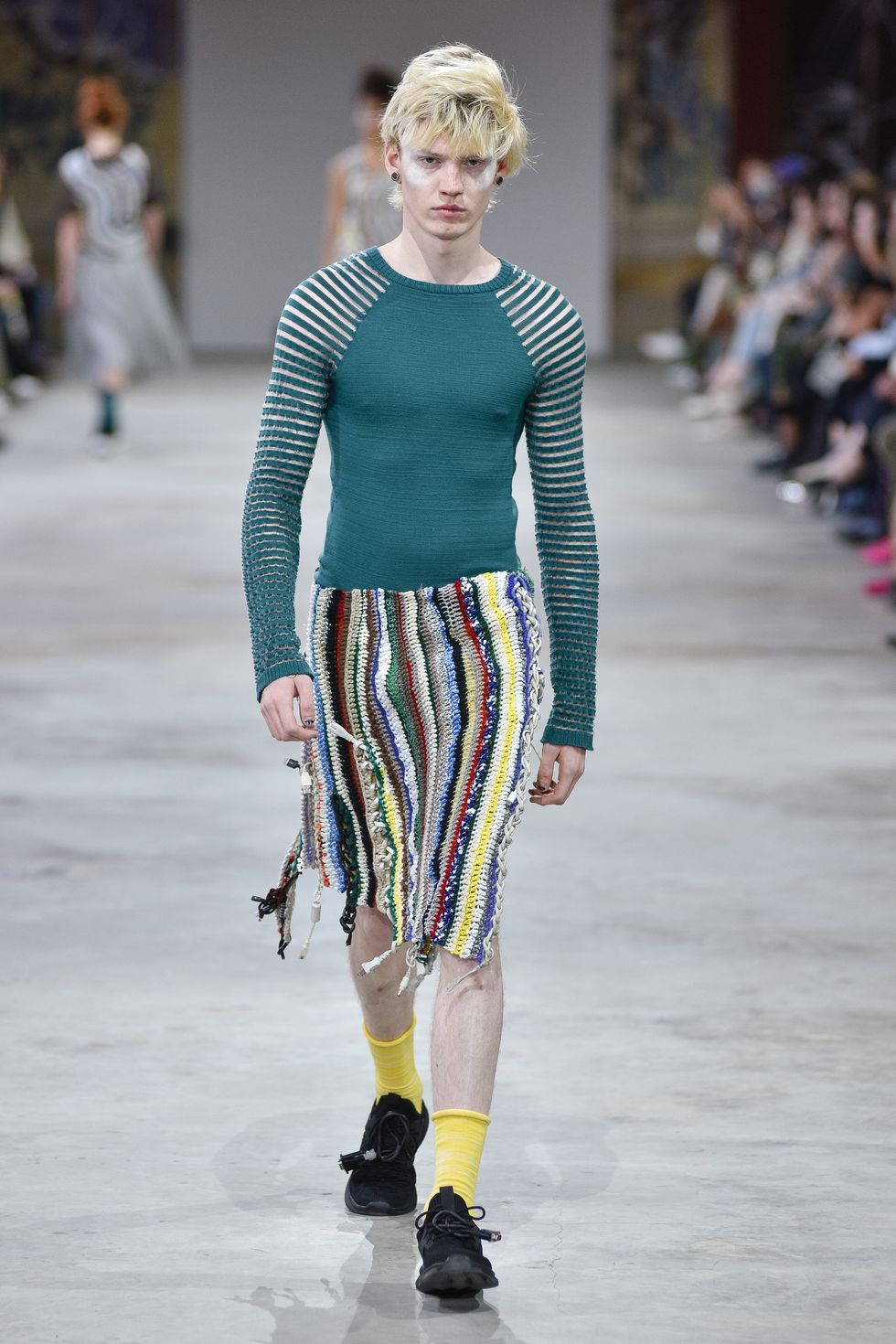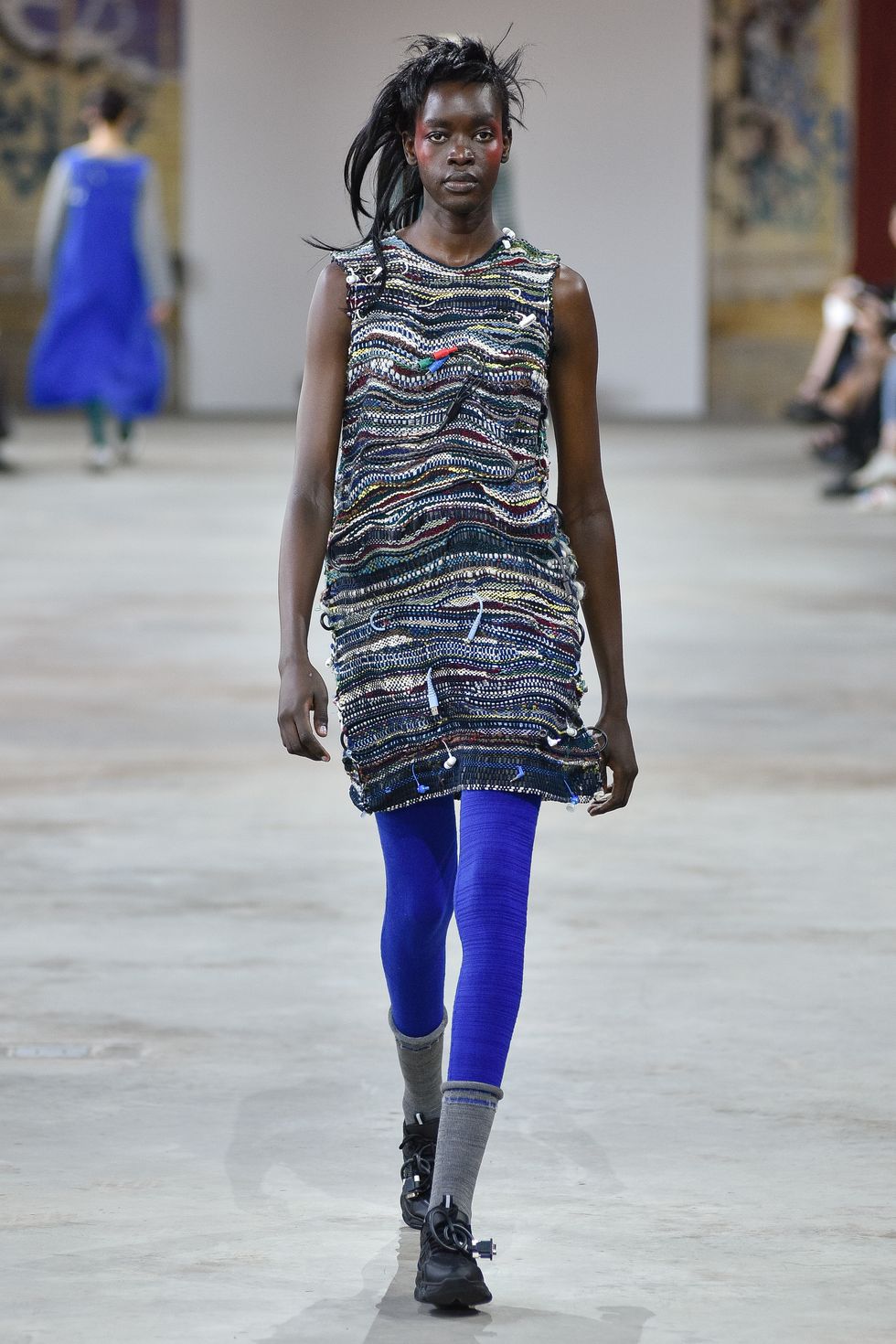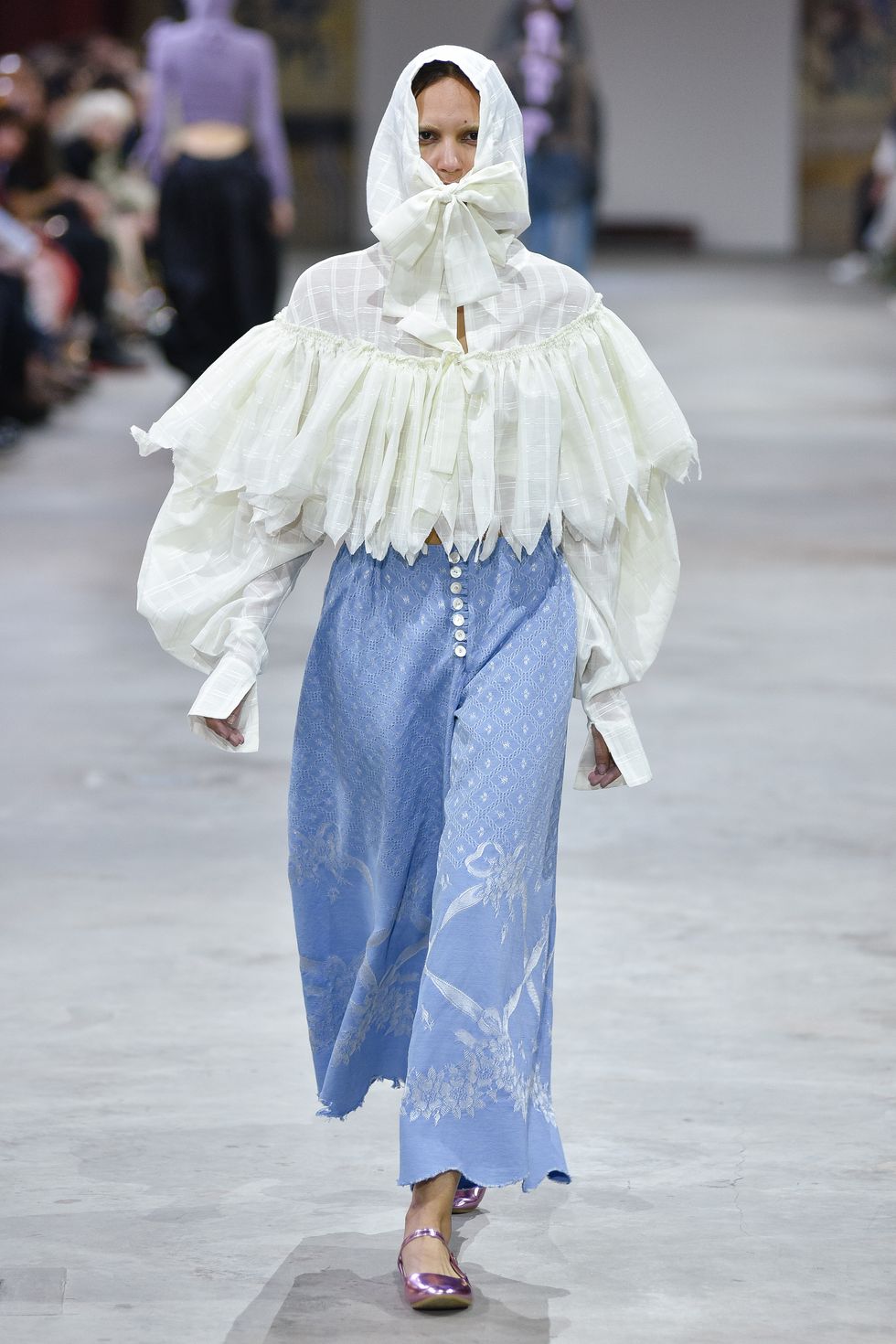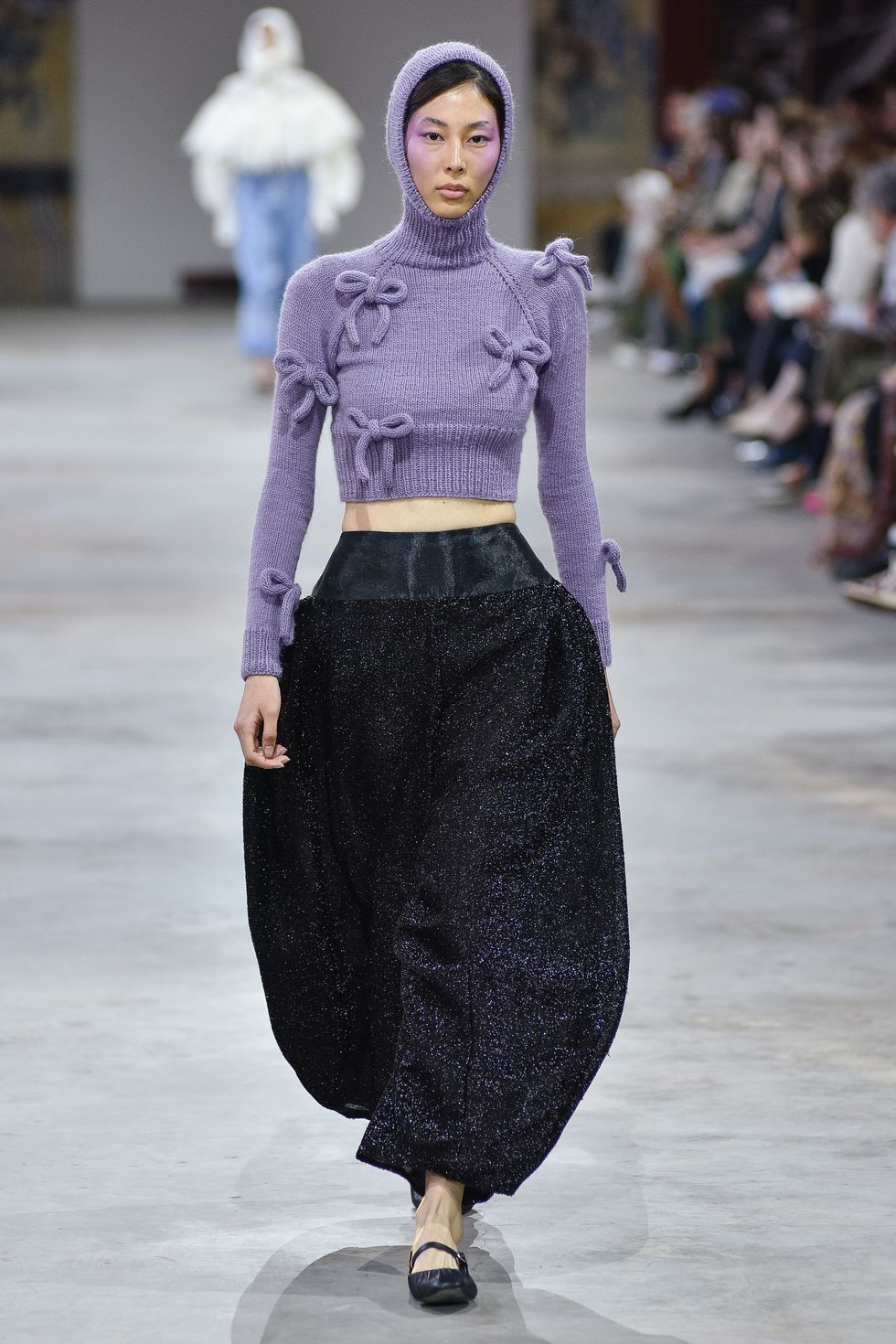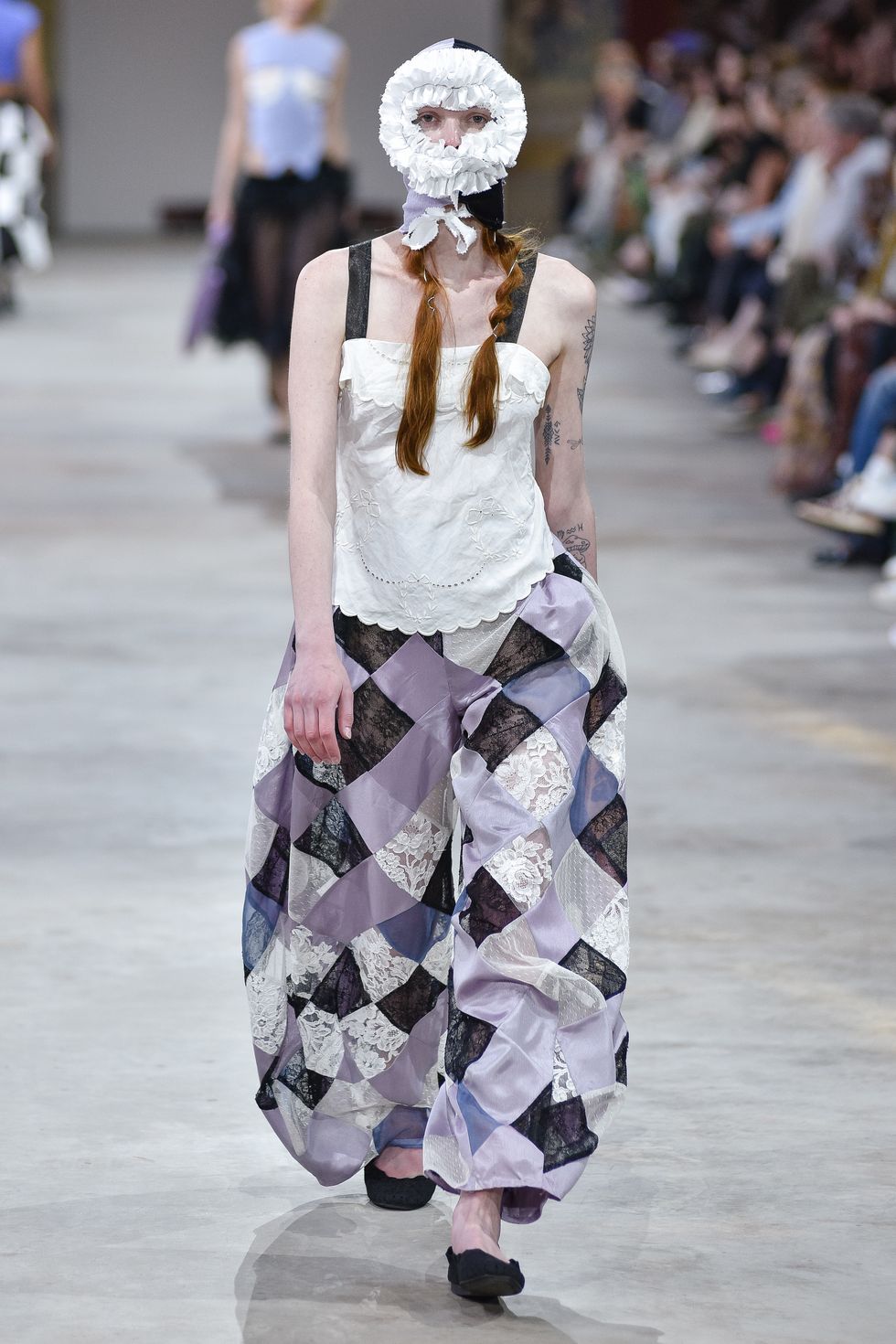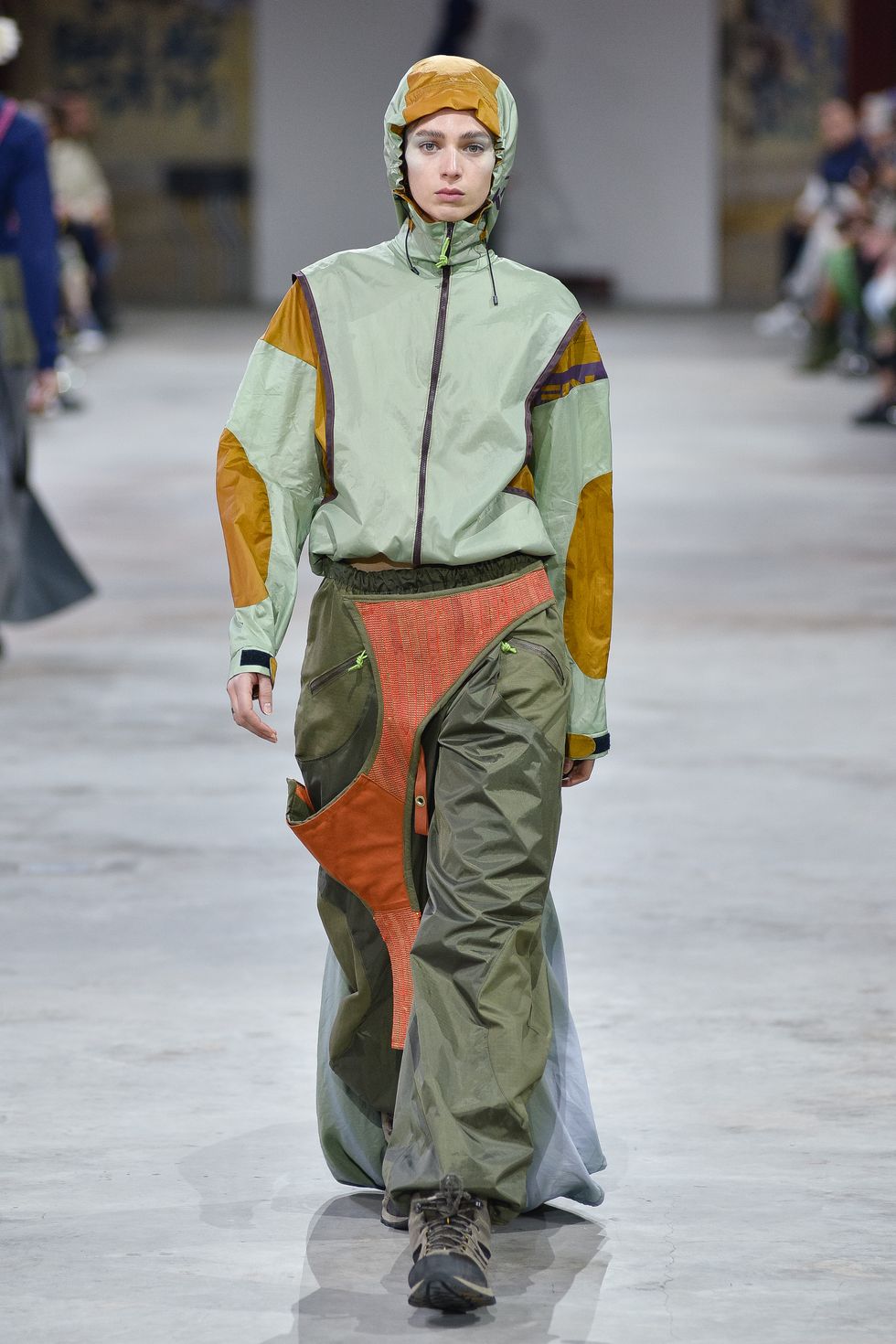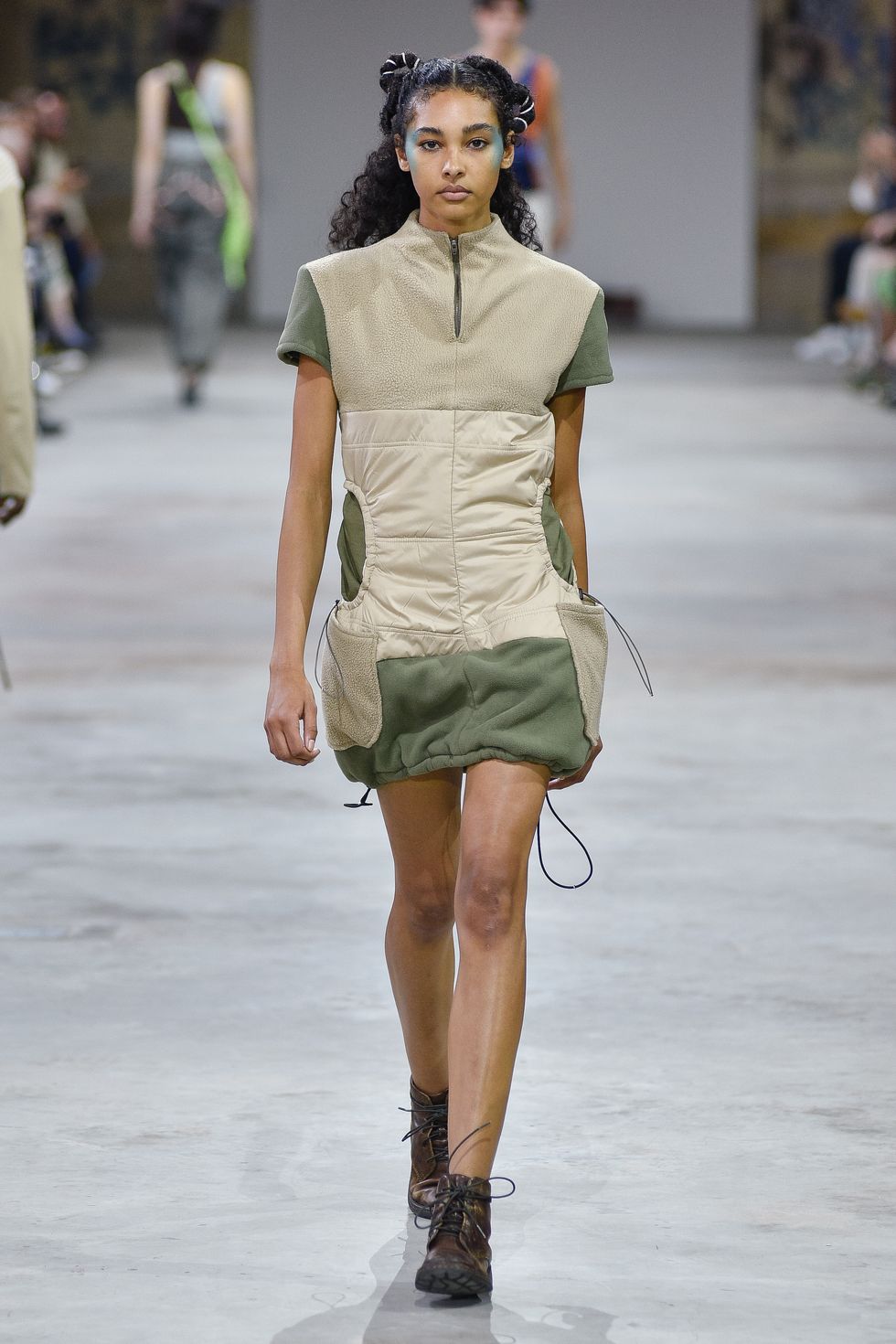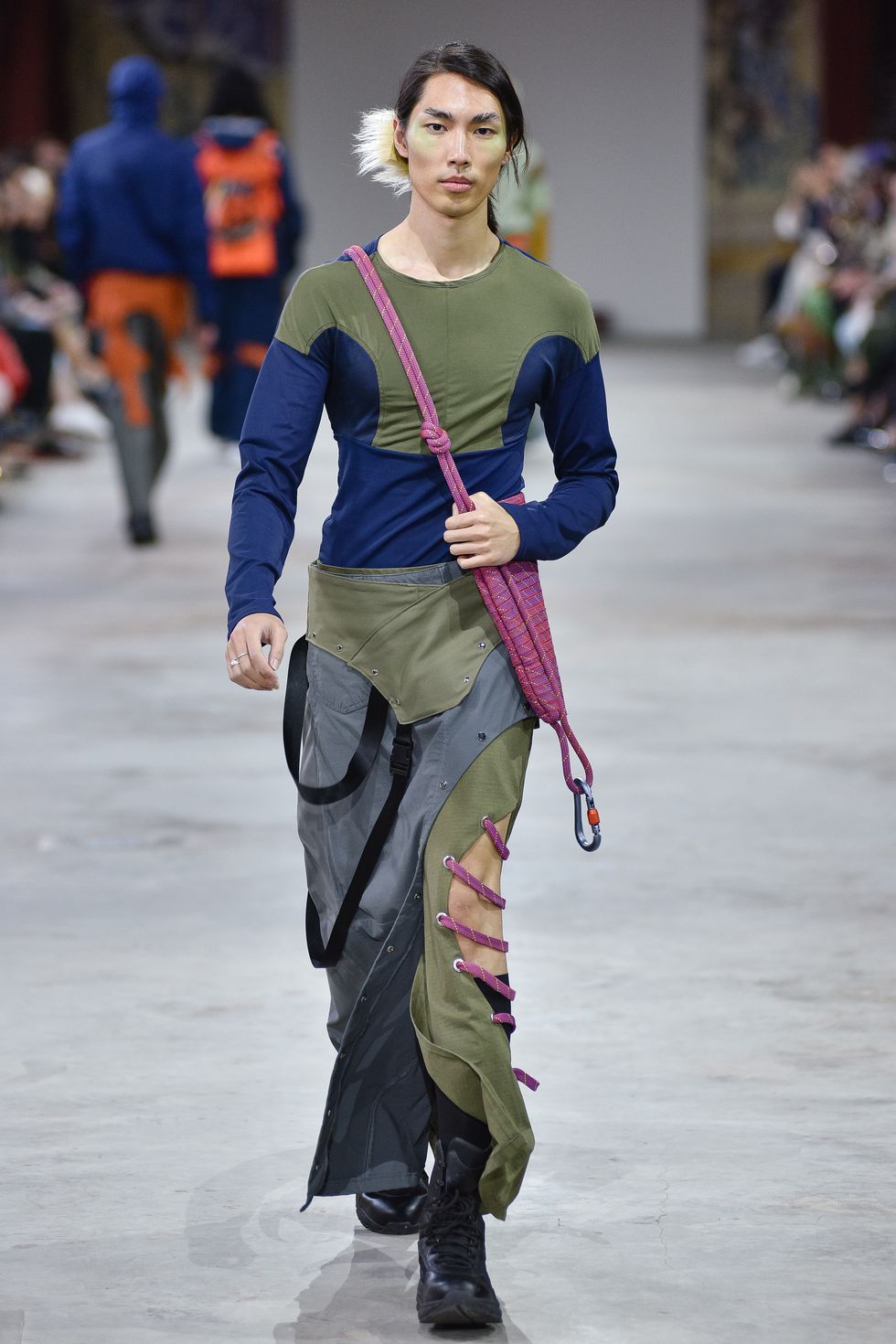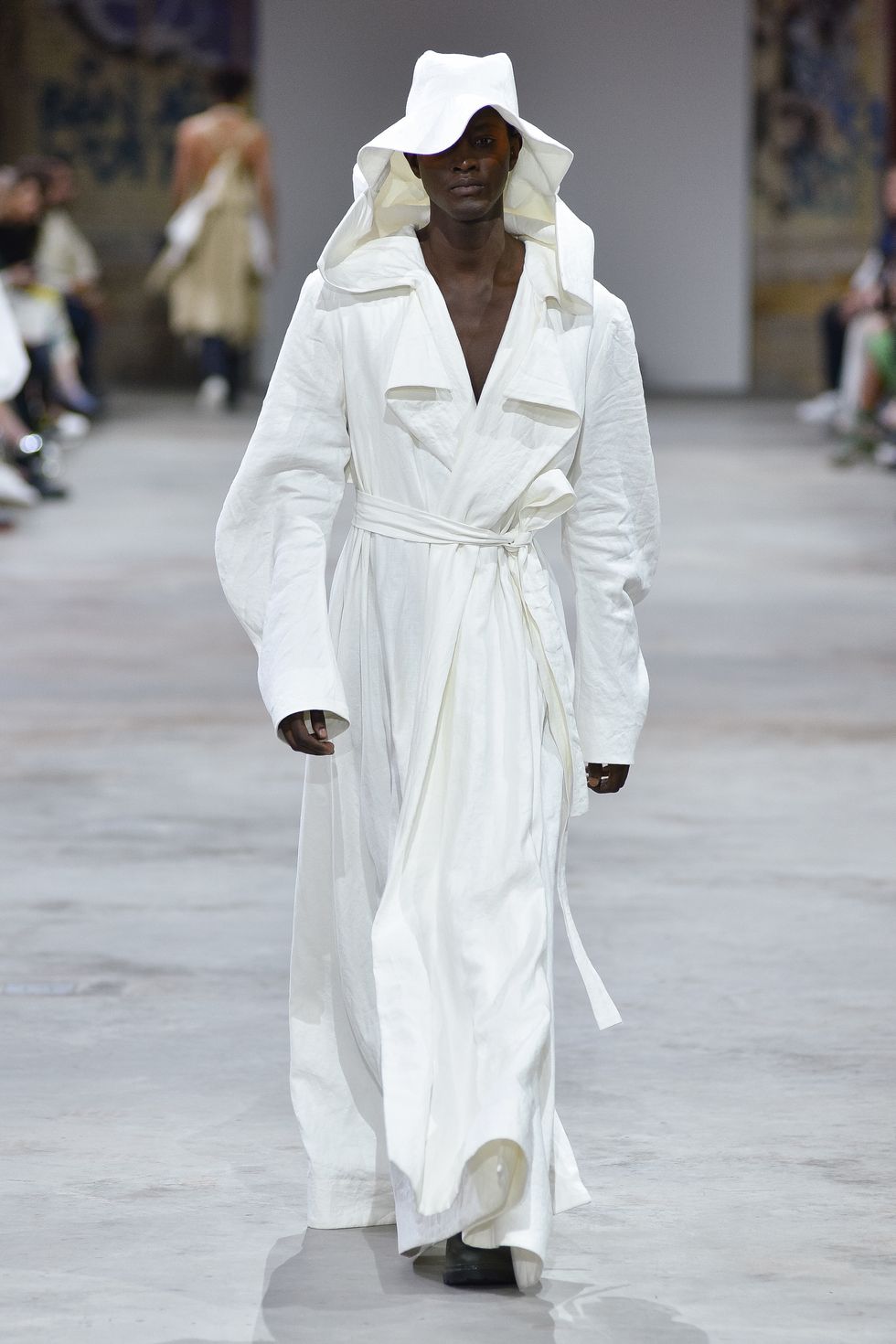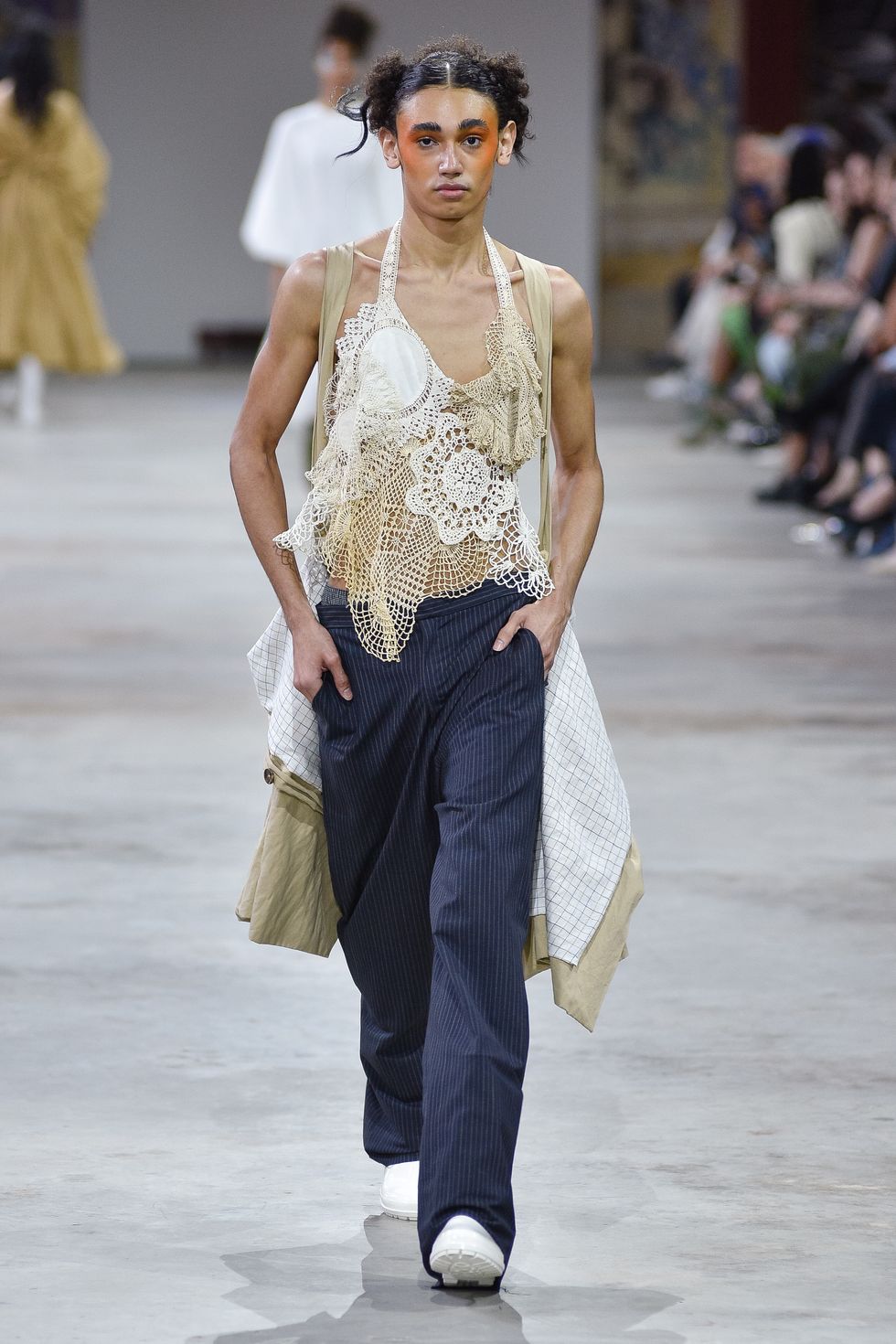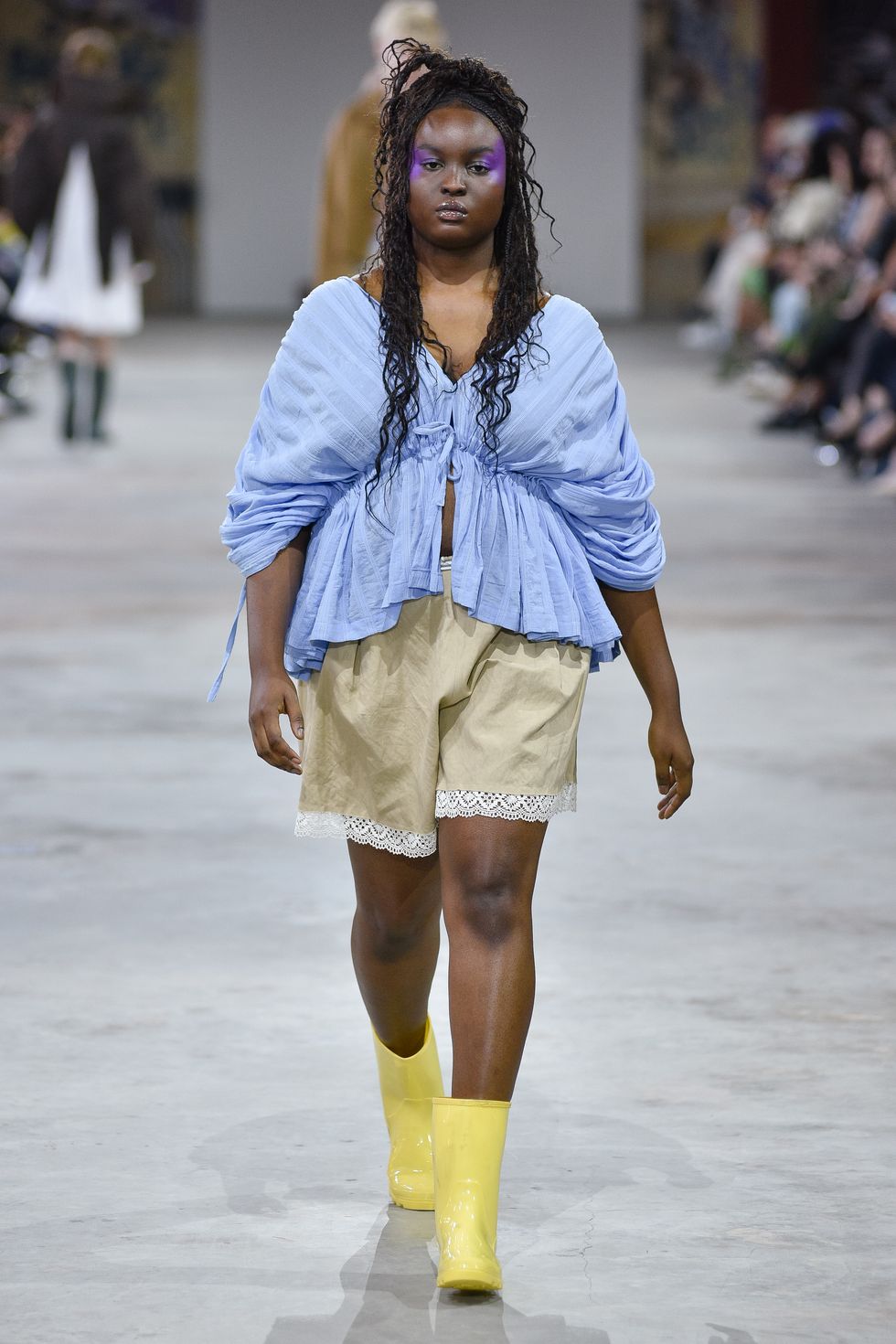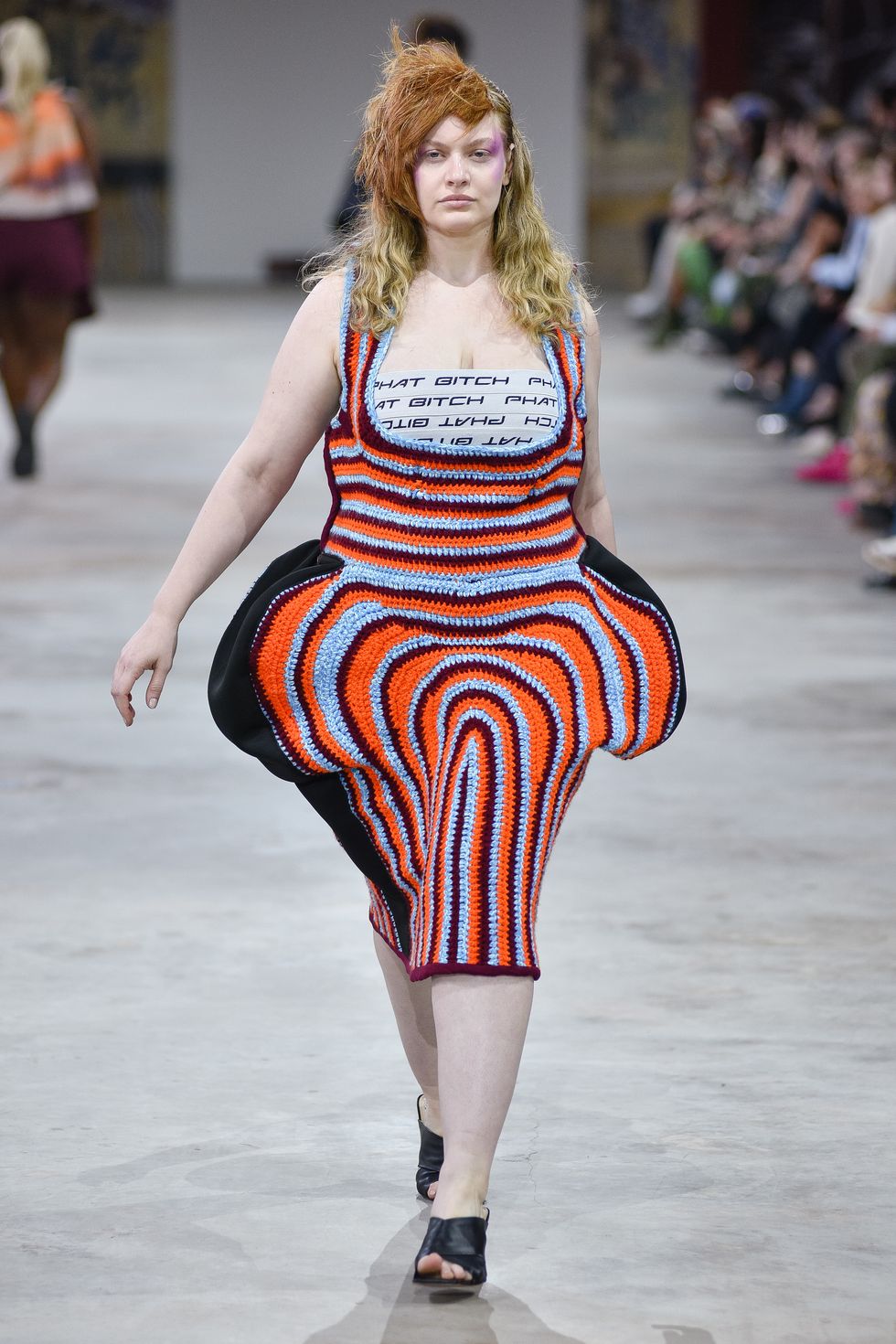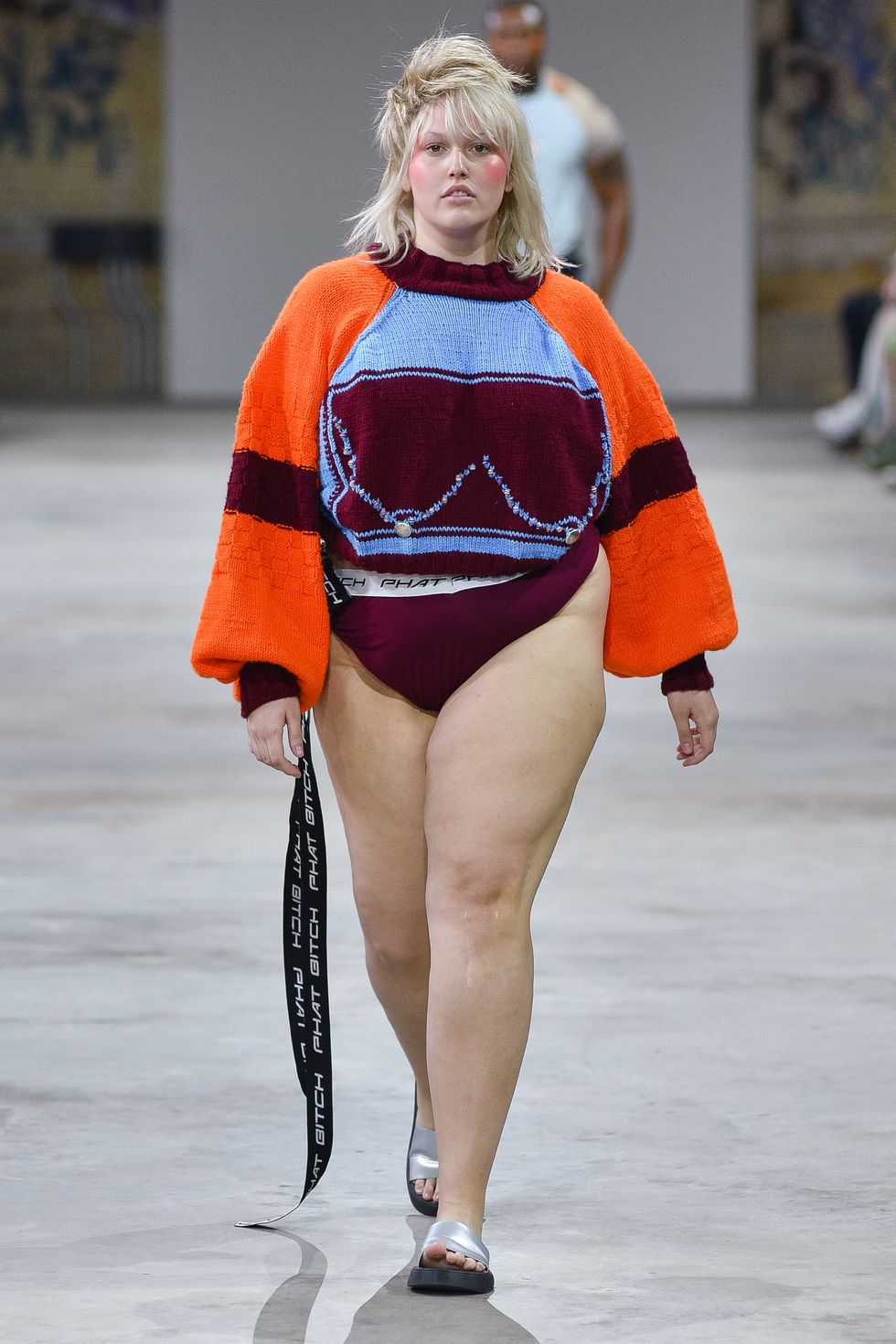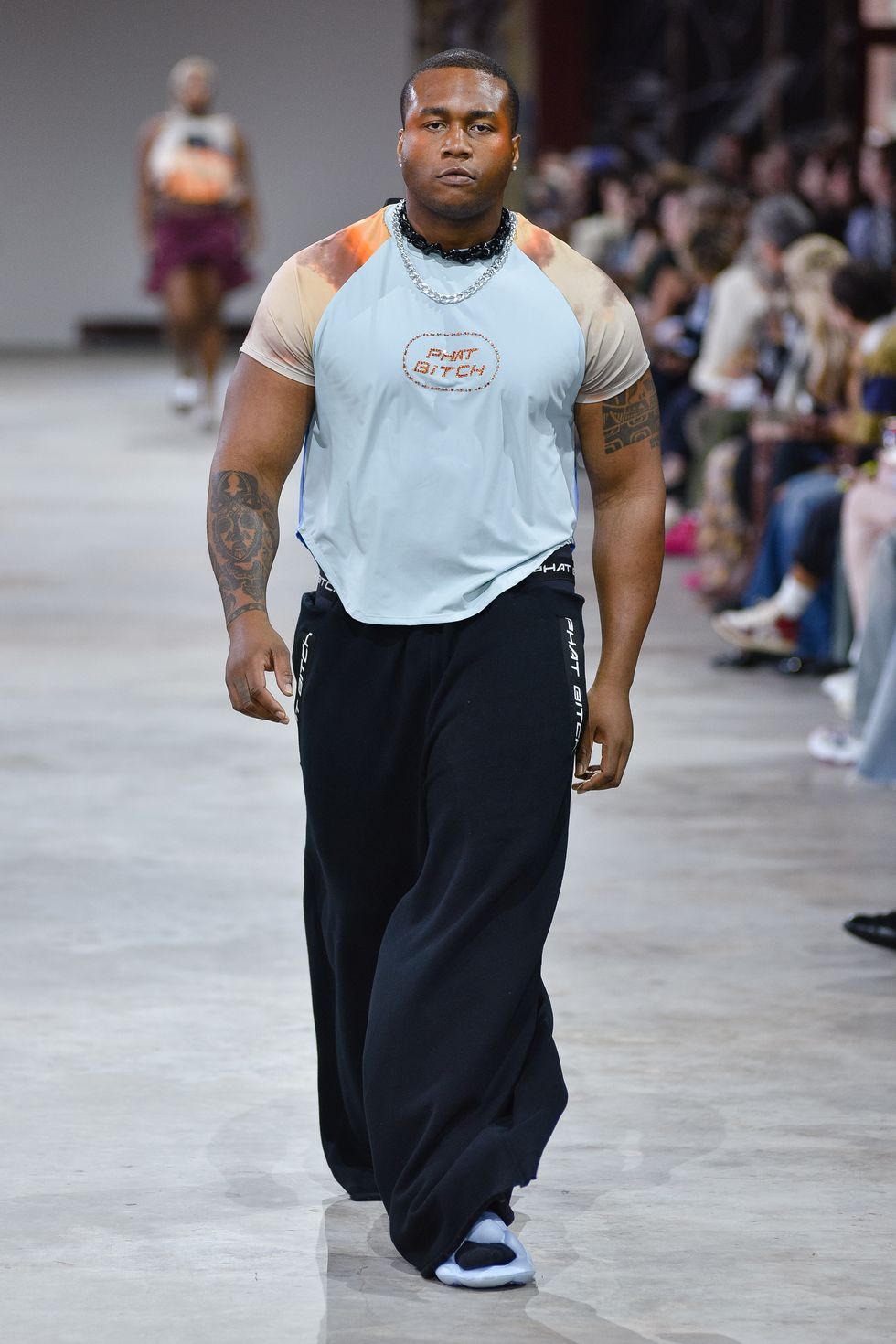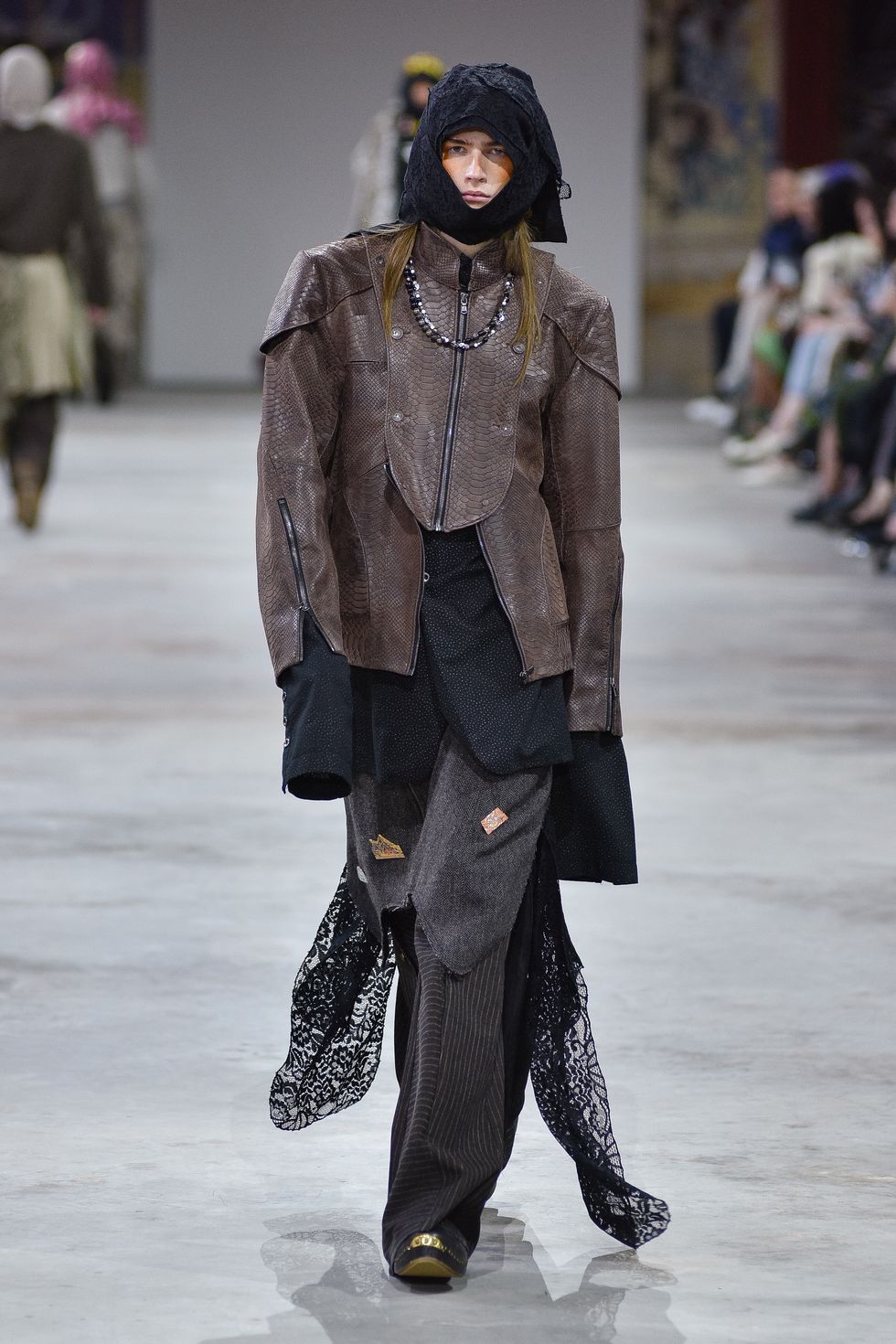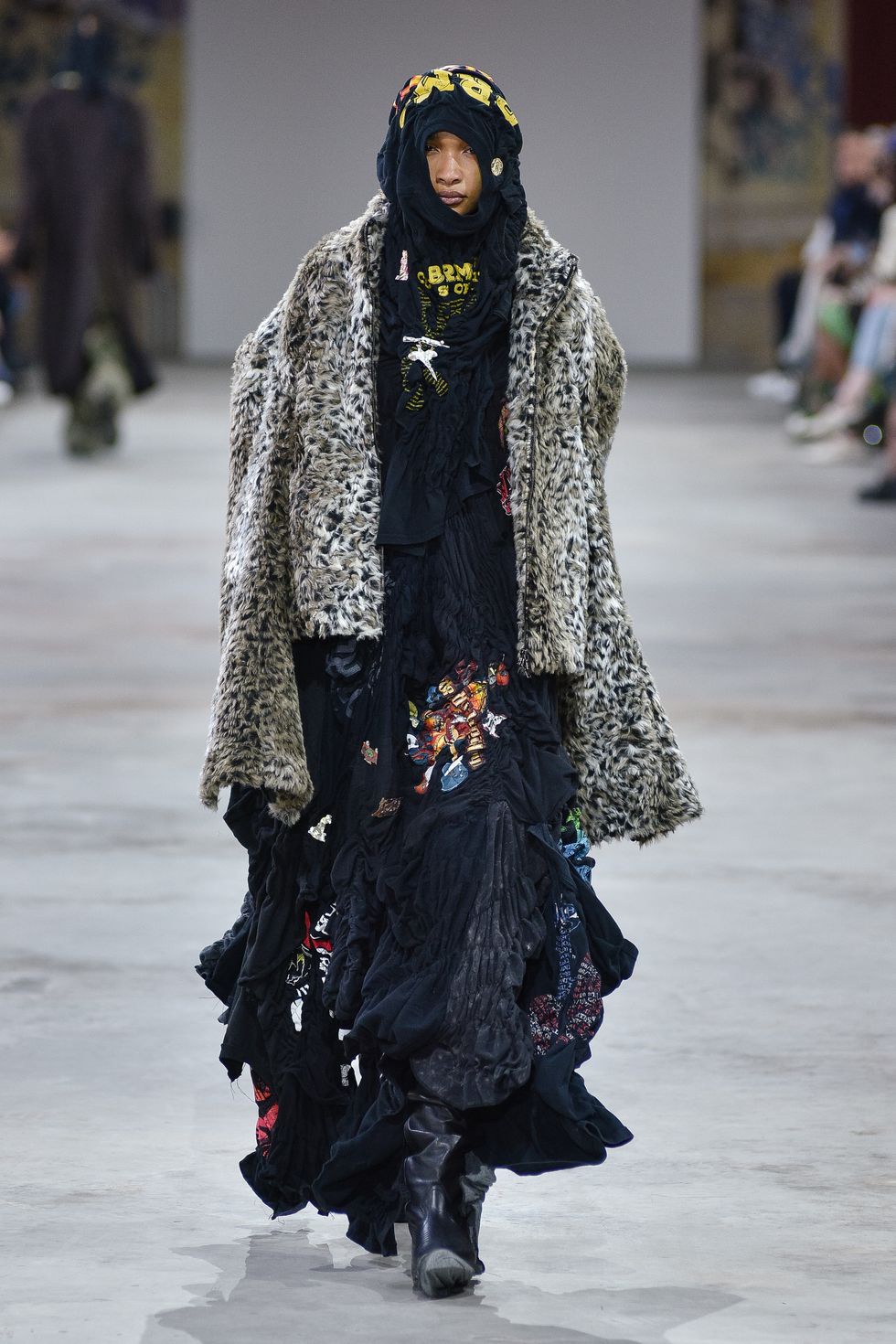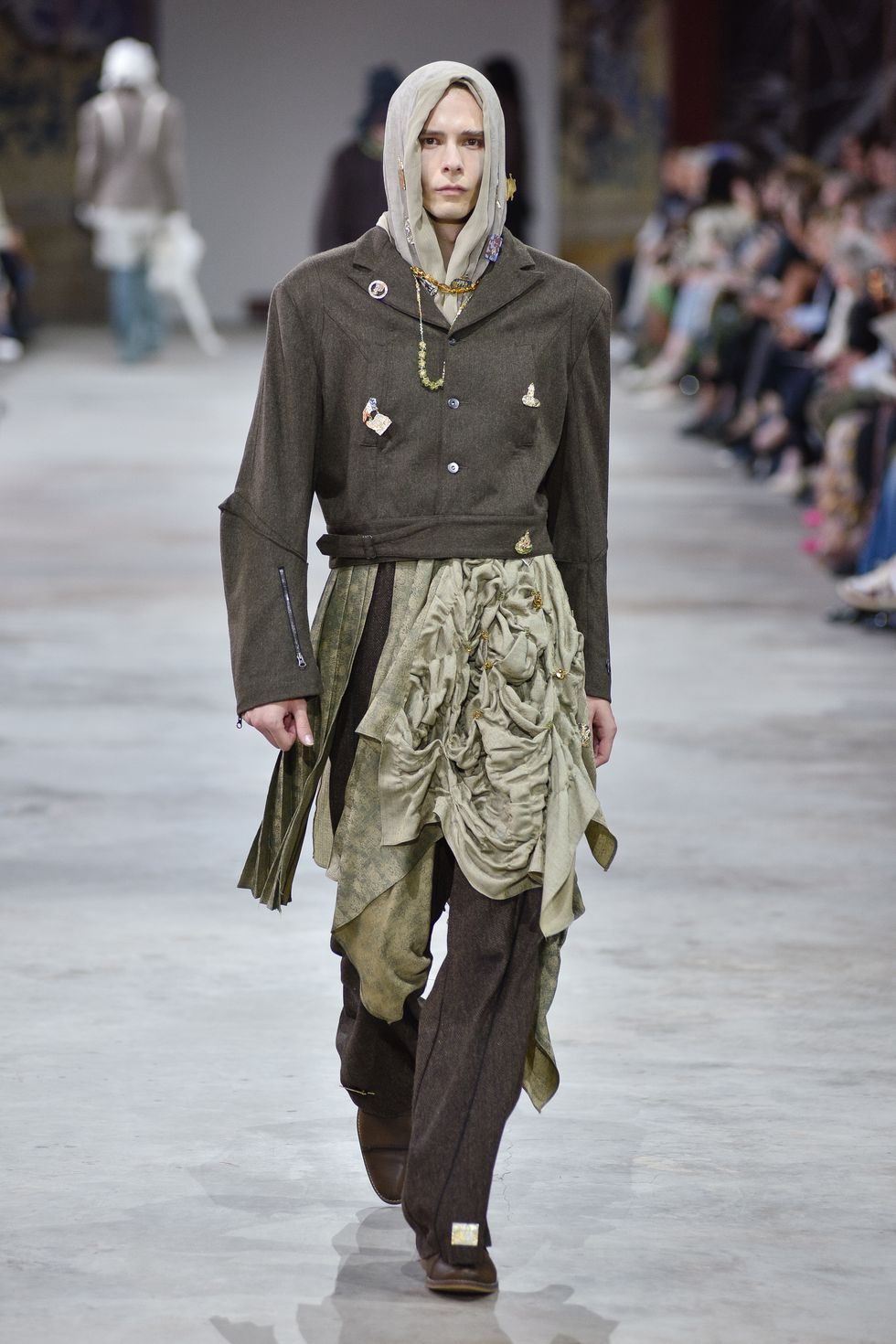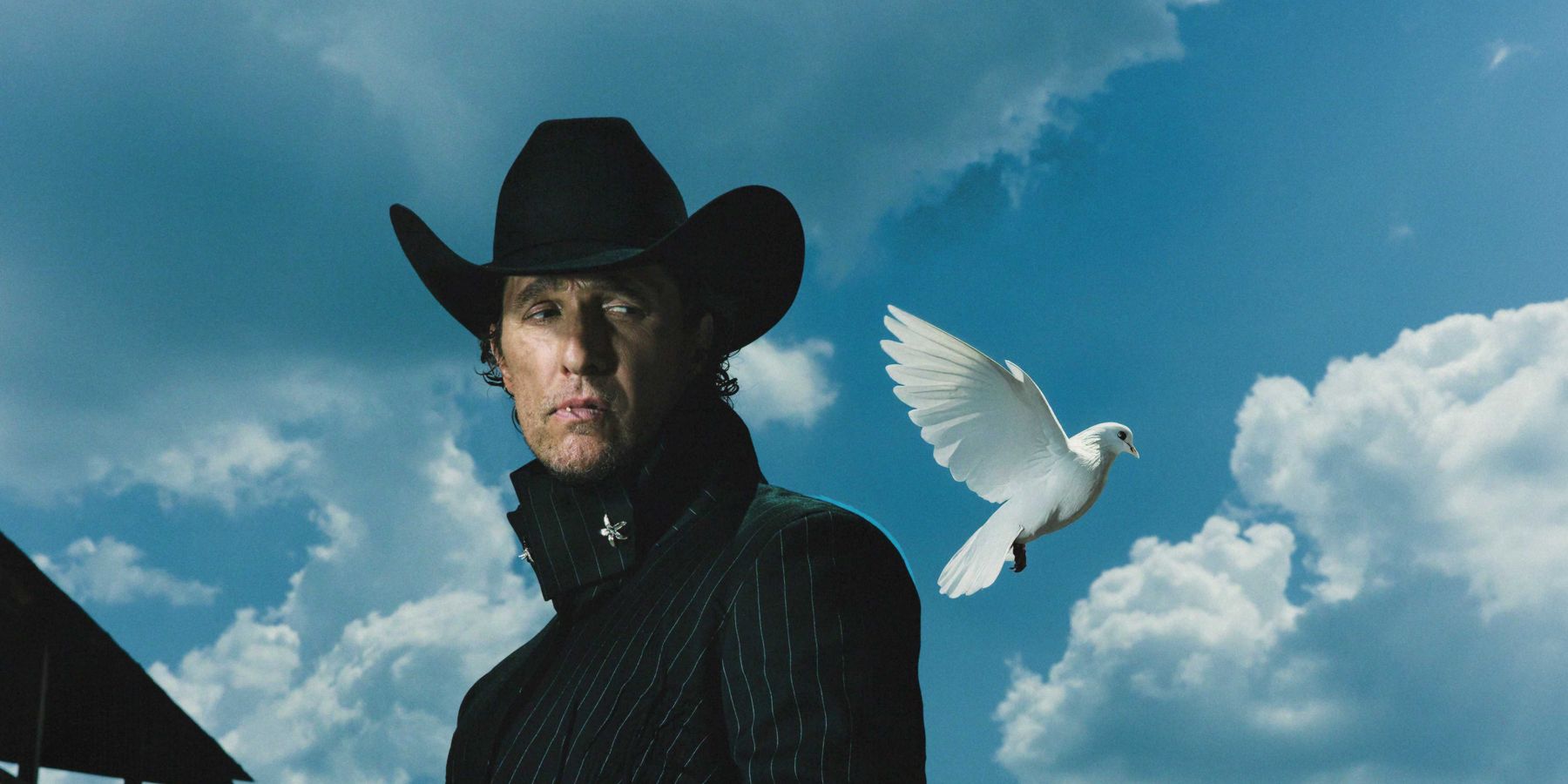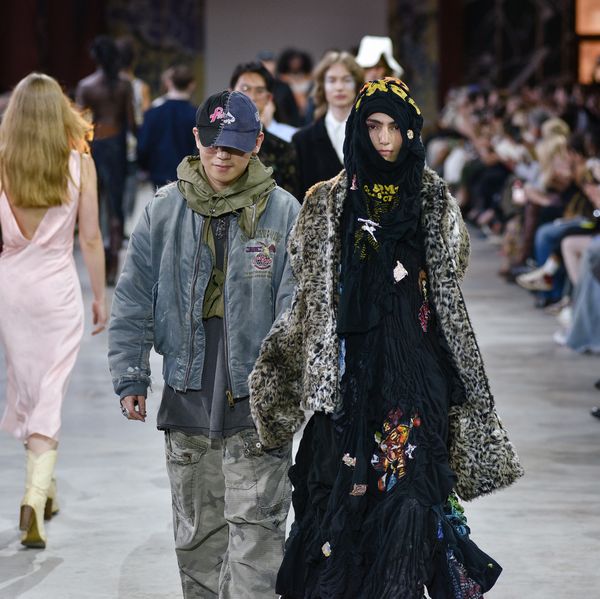
Pratt Institute's Fashion Class of 2024 on the Future
By Justin Moran
May 10, 2024Student fashion shows often feel like the most honest snapshots of our time, reflecting the complicated hopes and fears of the next generation.
At Pratt Institute’s 123rd annual presentation for graduating designers in May, 20 members of the school’s senior BFA class rolled out 180 looks from collections that accomplished exactly that — and did so with confidence. There seemed to be less of an interest in virality or shock value, trading out trends for an emphasis on craftsmanship, personal storytelling and developing clothes to last.
Below, PAPER spotlights a selection of Pratt’s students and learns more about what they’d like to see from the fashion industry.
What change would you like to see in the fashion industry?
I think there are endless changes that I hope will happen in the industry, however, it’s exciting to see people around me working outside of old boundaries. I personally enjoy natural dyeing, upcycling and reusing material in my work. I’d like to see more of this kind of sustainable use in fashion.
What perspective do you think you’re bringing to fashion?
I really enjoy making clothing and art that is reflective of my imagination, and is just interesting to look at, whether that’s colors, patterns or textures. I am seeing a lot of brands making very abstract and thoughtful work, and I’m looking forward to seeing more of this artistry.
What're you most hopeful about with the future of fashion?
I’m excited to keep learning, I’ve just dipped my toes in. I think what’s been so special for me is learning from my professors and making personal connections that have taught me how to work practically and also think creatively. It’s really wonderful doing something that is so technically historic and doing it around other people who are passionate about the same thing.
What change would you like to see in the fashion industry?
Expanding brand transparency when it comes to their fabrics, trims and construction. Clothing is something that is so personal and important to so many. Knowing both where and how your clothing is being made is something that I believe allows you to relate to the garments you wear on a deeper level.
What perspective do you think you're bringing to fashion?
The perspective I share with my work is heavily influenced by being raised in the Commercial Shellfishing Industry in Rhode Island, and draws inspiration from the idea of an Unofficial Uniform worn by members of my family and many others while working on the water. Playing with the idea of what you wear to work when there is no official dress code has been a lot of fun for me.
What're you most hopeful about with the future of fashion?
I’m most hopeful that the designers coming through many of the fashion schools now are being heavily educated by the global impact their livelihood has, and will have the knowledge to eventually make monumental changes on the toll our industry has on the environment going forward.
What change would you like to see in the fashion industry?
I hope that the fashion industry becomes a place that values the longevity and wearability of clothes first and foremost. I think that's what everyone actually wants out of clothes from a consumer point of view, and fast fashion continues to be fast fashion with terrible quality garments. There's less and less access to reliable clothing, and that needs to turn around.
What perspective do you think you're bringing to fashion?
I didn't grow up paying much attention to fashion, I came into it from a textile and fine arts perspective. In my process, I go about it more through designing wearable pieces rather than designing clothing. I like to be inventive with techniques and materials, and by using the medium of fashion, I get to see what it's like for these pieces to move and be used which I find so cool.
What're you most hopeful about with the future of fashion?
I think the industry is doing a lot to cut out wasteful aspects of the design process, like in using CLO, and designing clothes three-dimensionally digitally instead of using physical materials for a first draft. In my knit collection, I made my pieces fully fashioned (AKA not knitting yardage, knitting pieces to the shape of pattern pieces). The zero-waste approach in industrial knitwear has been figured out, and learning to use this technology at school is so cool that I can bring that expertise into my career in the industry, emphasizing zero-waste design.
What change would you like to see in the fashion industry?
I would love to see more community between designers and consumers. I think community and communication between makers and wearers makes the world of fashion a much more vibrant and exciting place to be. Slow fashion practices I think, really help to enable a world like that, where designers have the time to create work that speaks to people intimately.
What perspective do you think you're bringing to fashion?
I feel really intimately connected to the garments I make. When I was coming into the world of sewing and fiber arts, I was majorly inspired by historical costuming and historical practices for garment construction and I’m always carrying that with me when I make clothes. When I spend a great deal of time with a piece and finally finish it, I often feel like it’s become a living breathing object, that challenged me and spoke to me in unique ways. I think when we love our clothes deeply and want to save them and experience how they react and change with our bodies, there’s way less pressure to desire more.
What're you most hopeful about with the future of fashion?
I am so excited to see slow fashion in my generation gaining traction. I have been really vocal about ways to care for and upcycle clothes for years now, and people have come to me saying that I have helped them to grow an appreciation for the fiber arts and sewing, and that’s honestly all I could ever ask for.
What change would you like to see in the fashion industry?
I would like to see more inclusivity, specifically in adaptive wear. I think there is a big market for it because almost half of the population has either a mental or physical condition or disability that restricts their fashion decisions and purchases. I love including Velcro, snaps and as many pockets as possible because no matter what you are wearing, it should be functional besides fashionable or stylish. Reliability is so important, not just for its everyday wearer, but for people who have accessibility issues.
What perspective do you think you're bringing to fashion?
My main perspective is approaching inclusive wear that is multi-functional, unisex, and fitted for all shapes and sizes because when it comes to outdoor wear, nature does not discriminate. Also by combining other elements like the re-use of unconventional materials and awareness of environmental issues, I bring a more purposeful approach to design, where people can feel comfortable, stylish and proud of what they wear. I’ve also been trying to approach my designs circularly, so that once they’ve worn out. They can still be made anew in a different way, which plays a big role in making fashion more sustainable.
What're you most hopeful about with the future of fashion?
I’m a big nerd for industrial design, engineering and science, so when I see designers incorporating their other skills into their pieces that convert or are made of engineered bio materials, whatever it may be, it is incredibly inspiring. I love when science mixes with art. I also see more and more non-conventional materials being used like hair and technical wires.
What change would you like to see in the fashion industry?
I would love to see creative design solutions that fit multiple body types — tall bodies, short bodies, bodies with large chests, long torsos, seated bodies, disabled bodies and others — or at least more options for under-represented bodies.
What perspective do you think you're bringing to fashion?
My designs come from a place of inclusion and fluidity with sustainability being my ongoing practice. For example, my blue gathered top and striped dress made out of two triangles and a drawstring can fit anyone with minor adjustments according to their high point shoulder to waist and waist circumference measurements. Anyone, regardless of age, gender, and size can wear that and feel empowered. I think this nonbinary way of designing and dressing brings forth a sense of freedom that comes from being human first.
What're you most hopeful about with the future of fashion?
I am the most hopeful about the creativity and change my peers are going to bring to the future of fashion. I am inspired by the people around me everyday who are pushing boundaries, challenging norms and redefining what it means to be fashionable. The fashion industry has always been propelled forward by innovative and passionate people, and I’m looking forward to ingenious solutions to long standing challenges like building sustainable practices and inclusive designs that celebrate diversity. Technical advancements in the textile industry have been on my mind lately. Having worked with homemade bioplastics in my garments, I’m eager to see how fabrics made from agricultural byproducts like citrus peel cellulose and pineapple leaves are incorporated into the future of fashion.
What change would you like to see in the fashion industry?
I would love to see a change in how the fashion industry approaches body politics. Everyone wears clothes, but only a fraction of people are represented on the runway, whether that’s through size, height, ethnicity, sexuality or gender identity. If only one body is represented or promoted as the “ideal,” what does that say about everyone else? What does that say about who you, as a designer, want wearing your clothes?
What perspective do you think you're bringing to fashion?
I am by no means championing inclusivity concepts that haven’t already been established in the industry, just as I am not the first queer woman of color to design clothes. But by not reiterating these causes, such as demanding a ceasefire in and the liberation of Palestine, I am wasting an opportunity to promote them further. My perspective is one that understands the frustration of not being represented, taking action to call out injustice, and seizing any opportunity to promote these issues.
What're you most hopeful about with the future of fashion?
I am most hopeful about the fact that Gen Z is creating the future of fashion. I have found community in my peers’ ability to show courage and persistence in their beliefs. We have begun to reject the older ways of doing things because we see how harmful they are in the long term. We also understand that hope is not always enough. My generation knows that meaningful action is just as important and creative measures to achieve our goals must be taken.
What change would you like to see in the fashion industry?
I wish the industry would provide more platforms for young designers and more respect for the efforts made at every step of the process, not just design and marketing.
What perspective do you think you're bringing to fashion?
I think I can bring some "fuzzy" vision to the industry right now. To be honest, in this seemingly diverse environment, I am very uncomfortable with all the labels, Asian or Chinese, etc. As a Chinese born and raised in the '90s, I have a very vague sense of my identity. As a Chinese born and raised in the '90s, I have a very blurred sense of my identity, I am neither eastern nor western. I grew up in a so-called eastern culture, but all I learned and loved were western products. But when I really came to New York, I realized that I am not so western, I still have an oriental mindset and a love for ambiguity. This resonates with artists such as Huang Yong Ping or Xu Bing. Many of their works come from a limited range of materials and perspectives, and their ideas are not linear, but rather chaotic and random. This is where I think I may not be the same as many designers. I don't really like a fixed concept. I like to create something based on what I have as a starting point and constantly challenge my own thinking. In general, I don't create to express anything, but just to present a certain state of being. And such a being is kinda "fuzzy."
What're you most hopeful about with the future of fashion?
I wish the fashion industry could be more sustainable. Globalization has made fashion incredibly large, but also incredibly wasteful. I happened to live near some factories during the epidemic, and a lot of fabrics and accessories were wasted because of problems with orders not being canceled in time. I would like to see more transparency in the fashion industry and better communication between the different parts of the industry.
Photography: Fernando Colon (Courtesy of Pratt)
Related Articles Around the Web
MORE ON PAPER
ICONOS: Pepe Aguilar, El Oficio del Tiempo, la Voz del Silencio y el Peso del Legado
Español
Jan 19, 2026
Entertainment
Cynthia Erivo in Full Bloom
Photography by David LaChapelle / Story by Joan Summers / Styling by Jason Bolden / Makeup by Joanna Simkim / Nails by Shea Osei
Photography by David LaChapelle / Story by Joan Summers / Styling by Jason Bolden / Makeup by Joanna Simkim / Nails by Shea Osei
01 December
Entertainment
Rami Malek Is Certifiably Unserious
Story by Joan Summers / Photography by Adam Powell
Story by Joan Summers / Photography by Adam Powell
14 November
Music
Janelle Monáe, HalloQueen
Story by Ivan Guzman / Photography by Pol Kurucz/ Styling by Alexandra Mandelkorn/ Hair by Nikki Nelms/ Makeup by Sasha Glasser/ Nails by Juan Alvear/ Set design by Krystall Schott
Story by Ivan Guzman / Photography by Pol Kurucz/ Styling by Alexandra Mandelkorn/ Hair by Nikki Nelms/ Makeup by Sasha Glasser/ Nails by Juan Alvear/ Set design by Krystall Schott
27 October
Music
You Don’t Move Cardi B
Story by Erica Campbell / Photography by Jora Frantzis / Styling by Kollin Carter/ Hair by Tokyo Stylez/ Makeup by Erika LaPearl/ Nails by Coca Nguyen/ Set design by Allegra Peyton
Story by Erica Campbell / Photography by Jora Frantzis / Styling by Kollin Carter/ Hair by Tokyo Stylez/ Makeup by Erika LaPearl/ Nails by Coca Nguyen/ Set design by Allegra Peyton
14 October
Entertainment
Matthew McConaughey Found His Rhythm
Story by Joan Summers / Photography by Greg Swales / Styling by Angelina Cantu / Grooming by Kara Yoshimoto Bua
Story by Joan Summers / Photography by Greg Swales / Styling by Angelina Cantu / Grooming by Kara Yoshimoto Bua
30 September
